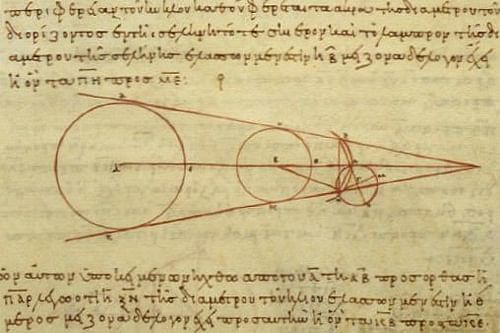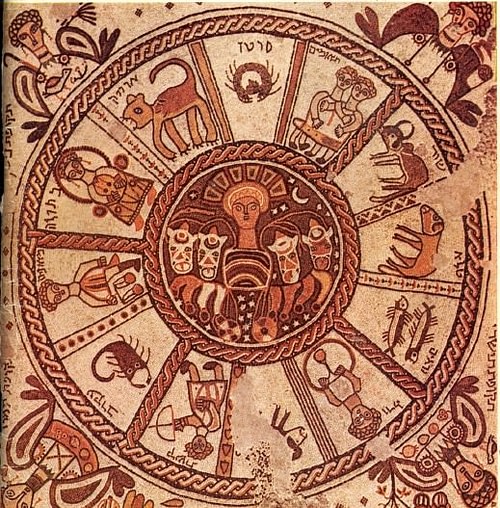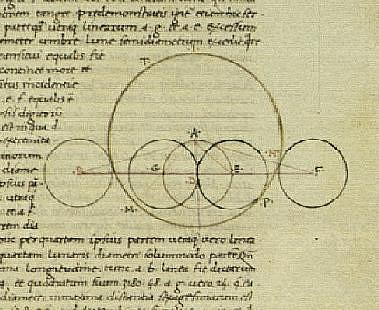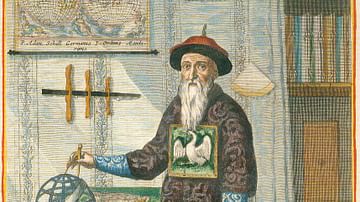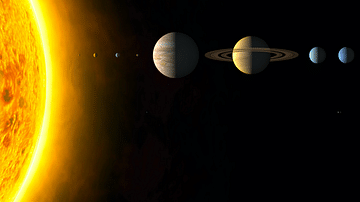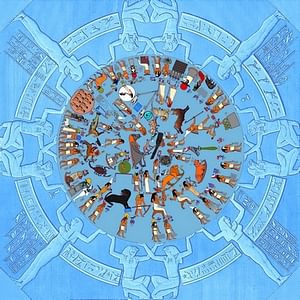
Hellenistic Astrology encompassed various forms of divination in Greece and the Mediterranean, all linked to the observation of astronomical phenomena. Hellenistic astrology was based on the belief that the stars and planets could either directly influence the Earth, or that their movements signified events on Earth.
Astrology drew on the prevailing scientific and philosophical beliefs of ancient Greece, and works of astrology were often produced as companions to works on Greek astronomy. It was one of the primary practical motivations behind astronomical inquiry and observation in antiquity. Although astrology was treated seriously at the time, it was based on a deeply flawed understanding of the cosmos. Breakthroughs in our understanding of the universe during the early modern period led to the separation of pseudoscientific astrological beliefs from the science of astronomy.
Origins of Astrology in the Near East
Astrology was one of many forms of divination practiced in the ancient Near East. To ancient observers, celestial objects such as stars and planets seemed like immortal and unchanging forces, in contrast to the seemingly unpredictable and unstable nature of life on Earth. The inability to explain astronomical phenomena made it seem divine.
Modern historians tend to categorize ancient astrology into different types, which focused on different phenomena. Omen astrology, which attempted to predict future events based on dramatic or unusual occurrences in the heavens, dates back to 8th-century BCE Babylon. Ancient astrologers interpreted astronomical events like eclipses, as well as strange weather like thunder or cloud formations, as signs of major turmoil. The earliest astrological predictions were warnings about events that could impact society, such as famine, civil strife, and the well-being of the royal family.
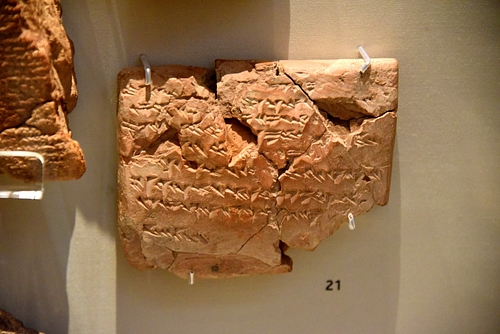
In the 1st millennium BCE, astronomers in the Near East developed mathematical tools to accurately predict the movements of the stars and planets. This allowed observers to make accurate predictions about the stars, and to develop more refined lunar and solar calendars. Armed with detailed knowledge of the divine, it was only logical that they would attempt to understand unexplained occurrences and predict the unknowable based on their information.
Having made observations of the stars over many years, and found out the motions and powers of each of them most accurately of all people, [the Chaldeans] foretell to people many of the things that are going to happen.
(Diodorus, 2.30. Trans. Jones and Steele)
Babylonian astrologers did not limit themselves to reading dramatic omens about the fate of the land. By the 5th century BCE, they had begun to seek connections between astronomical phenomena and individual outcomes. The Sun's annual journey and the seasonal cycle of death and rebirth inspired the idea of reading the course of a man's life in the heavens. Since it was not usually possible to know the position of the stars at the moment of a person's birth, astrologers made charts which could be used to determine planetary positions at the time and place of a person's birth. This type of natal astrology, or genethlialogy, did not reach the height of its popularity until a few centuries later, during the Hellenistic period.
Development of Hellenistic Astrology
Greco-Roman accounts of the Persian Wars mention astrologers among high-ranking Persian dignitaries, but it is unlikely that knowledge of astrology permeated Greek society during the Classical period. According to Hellenistic authors, astrology was introduced to Greece by a Babylonian priest named Berossus who established a school of astronomy on Kos around 280 BCE. Increasing cultural exchange with the Near East no doubt encouraged the growth of astrology in Greece, but Hellenistic astrology drew most heavily from Greek philosophy. Classicist A. A. Long noted that changes in the Greek understanding of physics and astronomy created the intellectual environment in which astrological theories proliferated.
Being largely in tune with the prevalent religious beliefs, philosophies, and medical theories of the ancient Mediterranean, astrology quickly grew in popularity. Ptolemaic Egypt, because of its influence over scholarship in the ancient Mediterranean through institutions such as the Library of Alexandria, played a particularly important role in the development of Hellenistic astrology. The earliest Greek horoscopes, written on papyri and ostraka (potsherds), have been discovered from 1st-century CE Egypt, where they had likely been produced since at least the 1st century BCE.
Many surviving Hellenistic astrology texts belong to Hermetic literature, a genre of esoteric writing which encompassed magical, astrological, and scientific treatises. Hermetic literature was a product of the Hellenistic period which combined contemporary Greek ideas with pieces of Egyptian and Babylonian cosmology. The authors of these texts sought to increase their appeal by falsely referencing impossibly ancient Egyptian or Near Eastern astral lore. In reality, ancient Egyptians had relatively little interest in astrology prior to the Hellenistic period.
Astronomy
Greek astrology was focused on the geometrical relationships between the planets, which was interpreted as cosmic and personal interactions between them. Hellenistic astrologers singled out a few astronomical objects as particularly significant, based on their apparent brightness and size. Foremost among these were the Seven 'Planets':
- Helios – Sun
- Selene – Moon
- Aries – Mars
- Hesperos – Venus
- Hermes – Mercury
- Zeus – Jupiter
- Kronos – Saturn.
In terms of characteristics and personality, planetary gods took after the Greek deities they represented.
In antiquity, the prevailing belief was that the heavenly bodies moved around the Earth. This misconception was challenged by Aristarchus of Samos (c. 310–230 BCE), but his model of a heliocentric universe would not gain widespread support for many centuries. To ancient observers of the night sky, it appeared that celestial objects moved around the Earth in geocentric orbit. This was imagined as a dome over the Earth, across which the stars and planets moved.
The Earth's year-long orbit around the sun made it appear to ancient observers as if the Sun was slowly moving in a 360 degree path. This path, the ecliptic, was divided into 12 sectors, each associated with a constellation. As the Sun's apparent position shifted in a yearly progression, it moved through these sectors. The Greek word zodiac, meaning a "procession of animals", refers to the symbols used to signify these sectors such as the Crab (Cancer) or the Centaur (Sagittarius).
They say that the starry circle, which the Greeks call the zodiac, contains a power such that each single part of the circle moves and changes the sky in a different way according to the positions of all the stars in these and neighbouring regions at any time; and they say that that power is modified by the planets, either when they enter that very part of the circle containing someone's birth, or that part which possesses some familiarity or harmony with the birth-sign. (Cicero, Div. 2.89, trans. Long)
On a practical level, ancient Greek horoscopes outlined fairly simple astronomical data, including the position of the planets and the zodiac sign which was 'rising' at the time of the individual's birth. The Greek word horoscopos literally means 'hour-watcher', signifying the importance of time and place to calculate these positions. Based on this information, astrologers purported to learn information about all aspects of a person's life.
Philosophy
Natural philosophers had long observed the influence that the Sun held over the Earth and the Moon over the tides. Based on these real observations, some philosophers further speculated that other celestial objects influenced life on Earth in other ways. For example, the phases of the Moon were held responsible for changes in human health and animal behaviour.
Different schools of religious and philosophical thought formed different theories about the nature of the stars. Most philosophers agreed that the stars were in some way divine, because of their perceived perfection in comparison to the imperfect Earth, and their otherwise inexplicable movement. In Aristotelian and Stoic philosophy, the stars were made out of a similar material as the human soul. One notable exception was Epicurean philosophy, which maintained that the stars were merely objects moved by winds.
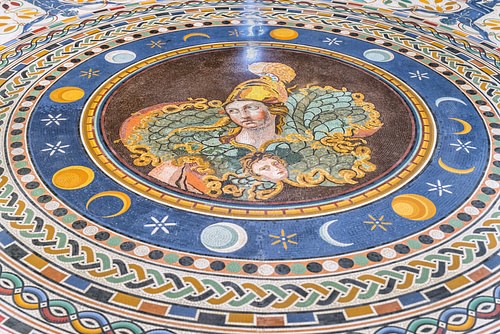
One of the most significant influences on Greek astrology was the philosopher Posidonius' (c. 135-51 BCE) theory of cosmic sympathy. Posidonius believed that all elements of the universe influenced one another. This cosmic sympathy meant that celestial bodies could exert influence over earthly phenomena and human behavior. Some philosophers agreed that the planets could be used for divination but maintained that they only signified events instead of directly causing them.
Hellenistic astrologers often incorporated ideas from different strains of philosophical thought to support their theories. However, many philosophers criticized astrology and its lack of efficacy. The Stoic philosopher Diogenes of Babylon (c. 2nd century BCE) maintained that astrologers could not predict fate, pointing out that twin siblings have different destinies despite being born at the same time. Astrology was also distrusted because of the potential dangers of predicting the future. Some philosophers considered the prediction of future events to be unethical because of the fatalistic outlook that it encouraged.
Medicine
Greco-Roman medical writers theorized that astrological conditions impacted physical health and personality, illustrating the intersection between ancient Greek medicine and metaphysical theory. Medical manuals describe the practice of using astrology to form a prognosis for patients or determine the best times to administer treatment. In Hellenistic astrology, the human body was divided into twelve parts, each ruled by a zodiac sign. Some physicians attempted to treat ailments with materials which were either similar or opposite to the affected body part's zodiac sign.
In the 5th century BCE, the Greek physician Hippocrates hypothesized that human personality, gender, and physical well-being were determined by an individual's proportion of hot, cold, wet, and dry qualities. These Hippocratic qualities were eventually applied to the zodiac which was divided into four elements; air signs which were hot and wet (Libra, Aquarius, Gemini), fire signs which were hot and dry (Aries, Leo, Sagittarius), earth signs which were cold and dry (Taurus, Virgo, Capricorn), and finally water signs which were cold and wet (Cancer, Scorpio, Pisces). The four elements were further identified as active and masculine (air and fire), or passive and feminine (earth and water).
Daily Life
While the ancient Greeks are sometimes viewed by modern commentators as exceedingly rational, Greek culture placed significant weight on the immaterial. From protective amulets to magical incantations, people looked for ways to make sense of and ultimately control their fates. Many Greeks went to astrologers for advice on the opportune moment to act, or to reveal events that had already occurred. This was especially popular as a way to plan enterprises, recover lost or stolen items, and understand past events.
People who frequented astrologers were often interested in what their future, or that of their loved ones, might hold. However, ancient horoscopes differed from modern horoscopes in many ways. While modern horoscopes tend to offer insight into personal life and emotional well-being, ancient horoscopes predicted important circumstances in an individual's life and were especially concerned with death.
Astrologers in turn relied upon astrology manuals to formulate predictions for their patrons, finding symbolism and associations that would fit their needs. Hellenistic astrology manuals produced complex and contradictory results based on astronomical data, which a skilled astrologer would then use to create personalized predictions. Horoscopes were also used to forecast the health, appearance, and personality of an individual. Astrology manuals detailing the purported cosmic influences upon a person's occupation, romantic life, and interpersonal relationships provide insight into the values of ancient Greeks.
Politics
Astrology, like other forms of divination, was used for political purposes as well as personal ones. By the late Hellenistic period, it was a well-known practice to cast a horoscope for a city based on the date of its foundation. Civic horoscopes were supposed to predict the fate of the city as well as its inhabitants.
Rulers leveraged astrological symbolism for propaganda purposes, minting zodiac symbols on coins in Hellenistic Syria and Alexandria, a practice that was later adopted by Roman emperors. Antiochus I of Commagene (r. 70-31 BCE) erected a monumental horoscope on Mount Nemrut to mark the occasion of his coronation. Zodiacs were also portrayed on temple ceilings at Ptolemaic temple complexes like Esna and Dendera.
Some astrologers also gained status as advisors to Hellenistic rulers. Diodorus Siculus (1st century BCE) reported that Babylonian astrologers made predictions for Darius I (r. 522-486 BCE), Seleucus I Nicator (r. 305-281 BCE), and Antigonus I (382-301 BCE). Strabo claimed that a Babylonian named Sudines made predictions for Attalus I (r. 241-197 BCE) during the Galatian War.
Greek Astrology after the Hellenistic Period
Hellenistic astrological practices were exported to other parts of Europe and Asia which had contact with the Greek-speaking Mediterranean. It had a particularly lasting impact on astrology in India and the Roman Empire. Much of modern historians' understanding of Hellenistic astrology derives from the works of Roman authors like Plutarch (c. 50 CE to c. 125), Vettius Valens (120 to c. 175 CE), and Firmicus Maternus (4th century), who lived long after the Hellenistic period. At the same time, Roman scholars such as Cicero (106-43 BCE) and Sextus Empiricus (c. 2nd century CE) would later formulate some of the most influential philosophical arguments against astrology until the Renaissance.
The two most important surviving Greek texts pertaining to astronomy and astrology are the Almagest and the Tetrabiblos, respectively. Both texts were authored by the Roman mathematician Claudius Ptolemy (c. 100-170 CE) during the 2nd century CE. The Almagest concerns itself mainly with the hard science of astronomy as it was understood at the time. The Tetrabiblos, its sequel, details the rules and history of astrology. The Tetrabiblos was considered the essential work of Hellenistic astrology during the Middle Ages.
Notably, Ptolemy was the first to use Hipparchus' (c. 190-120 BCE) zodiac, which began at the vernal equinox, rather than one of the constellations. In 127 BCE, Hipparchus noted that the orientation of the Earth's axial rotation was gradually shifting. Because of this slow precession, the Classical zodiac was slowly falling out of alignment with the observed positions of the stars. Hipparchus' discovery was ignored by his contemporaries. It was only through Ptolemy's work that his modified zodiac was transmitted into the modern day.
Through Roman authors, the Greek astrological tradition, along with other pseudoscientific and religious beliefs, were transmitted into medieval and early modern European literature. As a result, modern Western astrology draws heavily on the symbolism and terminology of ancient Greek astrology.

